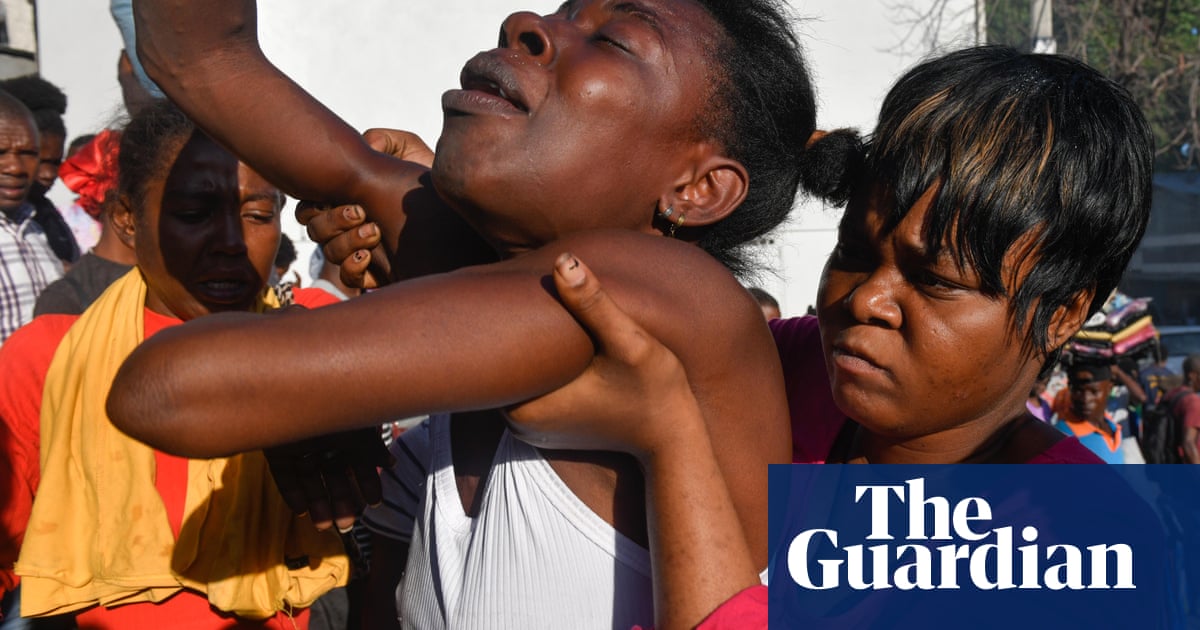
Moise was gunned down before dawn on Wednesday at his Port-au-Prince home
Power struggle ensues, pitting Moise appointee Ariel Henry against acting head of state Claude Joseph
PORT-AU-PRINCE: One of Haiti’s most powerful gang leaders said on Saturday his men would take to the streets in protest at the assassination of President Jovenel Moise, threatening to pitch the impoverished Caribbean nation deeper into chaos.
Jimmy Cherizier, an ex-cop known as Barbecue who heads the so-called G9 federation of nine gangs, railed against police and opposition politicians whom he accused of colluding with the “stinking bourgeoisie” to “sacrifice” Moise.
“It was a national and international conspiracy against the Haitian people,” he said in a video address, dressed in khaki military fatigues sitting in front of a Haitian flag.
“We tell all bases to mobilize, to mobilize and take to the streets for light to be shed on the president’s assassination.”
Earlier, Moise’s widow accused shadowy enemies of organizing his assassination to stop democratic change, as a struggle for power intensified in the Caribbean country.
Moise was gunned down before dawn on Wednesday at his Port-au-Prince home by what Haitian authorities said was a unit of trained assassins comprising 26 Colombians and two Haitian Americans.
Doubts have grown, though, about that narrative, with families of at least two of the Colombians saying they had been hired as bodyguards.
Martine Moise, who was wounded in the attack on the president’s private residence and flown to Florida for medical treatment, said her husband was targeted for political reasons.
“You know who the president was fighting against,” she said in a recording released on Twitter, without naming anybody.
“They sent mercenaries to kill the president at his home with members of his family because of roads, water, electricity and the referendum as well as elections at the end of the year so that there is no transition in the country.”
The late president had spoken of dark forces at play behind years of unrest under his mandate — rival politicians and oligarchs angry about what he called his attempts to clean up government contracts and politics — and proposed a referendum to change Haiti’s constitution.
The referendum, scheduled for Sept. 26 along with presidential and legislative elections, could abolish the prime minister’s position, reshape the legislative branch and strengthen the presidency. Critics called it a power grab.
Moise’s killing has clouded those plans and led to political disarray in Haiti, where the acting government has appealed for US and UN troops.
The United States said it has no plans to provide Haiti with military assistance for now, while the request to the United Nations would need Security Council authorization.
Power struggle
Late on Friday, the man Moise appointed as prime minister just before the assassination claimed the right to lead Haiti, pitting him against acting head of state Claude Joseph, whose government has managed the response to the killing to date.
Ariel Henry, a neurosurgeon who Moise named prime minister on Monday, told Reuters late on Friday he was now the highest authority in Haiti, not interim Prime Minister Joseph, and that he was forming a government.
“After the president’s assassination, I became the highest, legal and regular authority because there was a decree nominating me,” he said.
Henry said his government would create a new electoral council which would determine new dates for elections to be held “as soon as possible.”
But Henry has yet to be sworn in, and Joseph, who was named interim prime minister in April, has stayed put.
The power struggle has created confusion over who is the legitimate leader of the country’s 11 million people.
Elections Minister Mathias Pierre said acting premier Joseph would keep that role until the Sept. 26 vote.
Meanwhile, Haiti’s Senate, which currently comprises just a third of its usual 30 senators, nominated its head https://www.reuters.com/article/us-haiti-president-senate/haitis-senate-..., Joseph Lambert, on Friday to act as the interim president, a document reviewed by Reuters showed.
(Reporting by Andre Paultre in Port-Au-Prince, Sarah Marsh in Havana, Luis Jaime Acosta and Julia Symmes Cobb in Bogota; Writing by Cassandra Garrison; Editing by Paul Simao, Jonathan Oatis and Daniel Wallis)












